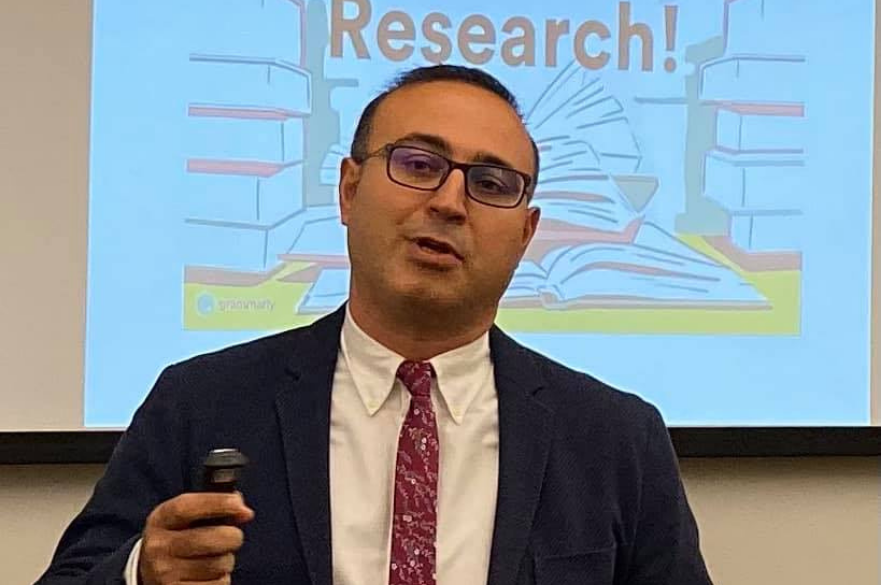Listen, respond, say sorry – food delivery customers reveal how to make it right after failures in service
Food delivery services should give customers a voice, respond quickly to complaints and proactively apologise when things go wrong, according to a new study which explores what companies can do to rebuild trust after failures.
By Helen Breese | Published on 23 September 2022
Categories: Press office; Research; Nottingham Business School;

Researchers at Nottingham Business School, part of Nottingham Trent University, University of Edinburgh, Edinburgh Napier University, University of Wolverhampton and The University of Central Florida surveyed 925 people on their experiences with Iran’s largest online food ordering platform – a service similar to those such as Uber Eats and Deliveroo - which receives more than two million online visits each month.
The survey was followed up by 45 in-depth interviews to better understand how people experience and recover from services failures during food ordering and delivery.
The survey revealed that an apology, an offer of compensation, and giving customers a voice to air their grievance all helped to rebuild trust through forgiveness.
However, responses also suggested that customers who were more familiar with company failures were more likely to respond negatively to apologies and offers of compensation, feeling their voice wouldn’t be heard. Here, when an incident has become public knowledge and awareness amongst consumers is high, firms should quickly and proactively accept responsibility and provide automatic compensation as these may be inevitable; positioning their response in a manner likely to provide the best chance of recovery and retention.
Anger and frustration were found to be key themes in the interviews. However, these emotions were not related to the service failure itself, but instead to factors such as the response provided by the company, a perceived ineffectiveness in handling complaints, and not giving customers a chance to be heard.
Participants were also frustrated by generic complaint-handling processes, instead desiring a personal response from the company. This exacerbated negative emotions and increased the likelihood of the customer not using the service again.

Professor Babak Taheri
Babak Taheri, Professor of Marketing at Nottingham Business School’s Marketing and Consumer Studies Research Centre, said: “A positive reputation and customer retention is vital for food delivery services which need to attract food vendors to partner with them.
“While we focused on one company for this study, all food delivery services can learn from the comments we received. The importance of having a service recovery strategy cannot be underestimated when it comes to rebuilding trust among customers, particularly those who order frequently and have already experienced a company’s response to failure.
“We see that customers are often not discouraged from using a service due to the failure itself, but the way it is handled. Food service delivery companies should take note of the need for a quick, clear, and personalised complaints process which is open to feedback and ensures repeat custom.
“We also found that awareness had an impact, so if food service failures receive media coverage or are discussed on social media, consumers are more likely to voice their concerns and seek compensation. When an incident has become public knowledge and awareness amongst consumers is high, firms should quickly and proactively accept responsibility and provide automatic compensation; positioning their response in a manner likely to provide the best chance of recovery and retention.
“They must provide these more proactive problem-solving methods in order to restore relationships with consumers through openness and honesty before their customers become increasingly aware, knowledgeable, and initiate their own service recovery efforts.”
The paper Investigating the Effects of Service Recovery Strategies on Consumer Forgiveness and Post-Trust in the Food Delivery Sector has been published in the International Journal of Hospitality Management.
For further information on the Marketing and Consumer Studies Research Centre at Nottingham Business School visit the website, Twitter or LinkedIn.
Notes for Editors
Press enquiries please contact Helen Breese, Public Relations Manager, on telephone +44 (0)115 848 8751, or via email.
About Nottingham Business School at Nottingham Trent University
Nottingham Business School (NBS) at Nottingham Trent University (NTU) is a leader in experiential learning and personalisation of business, management and economics education and research, combining academic excellence with positive impact on people, business and society. NBS has an unrivalled level of engagement with business, public and voluntary organisations. With more than 8,000 students, NBS is also one of UK’s largest business schools.
NBS is Quadruple+ Accredited by EQUIS, AACSB, EFMD BA for International Business, which are globally recognised hallmarks of excellence and quality for business education. NBS is also accredited by Small Business Charter, providing support and development for SMEs. The school is also a PRME Champion and held up as an exemplar and beacon by the United Nations Principles of Responsible Management Education (PRME).
About Nottingham Trent University
Nottingham Trent University (NTU) received the Queens Anniversary Prize for Higher and Further Education in 2021 for cultural heritage science research. It is the second time that NTU has been bestowed the honour of receiving a Queen’s Anniversary Prize for its research, the first being in 2015 for leading-edge research on the safety and security of global citizens.
NTU was awarded Modern University of the Year 2023 (The Times and Sunday Times), Outstanding Support for Students 2020 (Times Higher Education Awards). It was the University of the Year 2019 (Guardian University Awards, UK Social Mobility Awards), Modern University of the Year 2018 (Times and Sunday Times Good University Guide) and University of the Year 2017 (Times Higher Education Awards).
NTU is the 5th largest UK institution by student numbers, with over 33,000 students and more than 4,000 staff located across five campuses. It has an international student population of 4,000 and an NTU community representing around 160 countries.
In the past 15 years, NTU has invested £450 million in tools, technology and facilities.
NTU is in the UK’s top 10 for number of applications and ranked first for accepted offers (2019 UCAS UG acceptance data) It is also among the UK’s top five recruiters of students from disadvantaged backgrounds.
75% of NTU students go on to graduate-level employment or graduate-entry education / training within fifteen months of graduating (Guardian University Guide 2021).
NTU is 4th globally (and 3rd in the UK) for sustainability in the 2021 UI Green Metric University World Rankings (out of more than 900 participating universities).